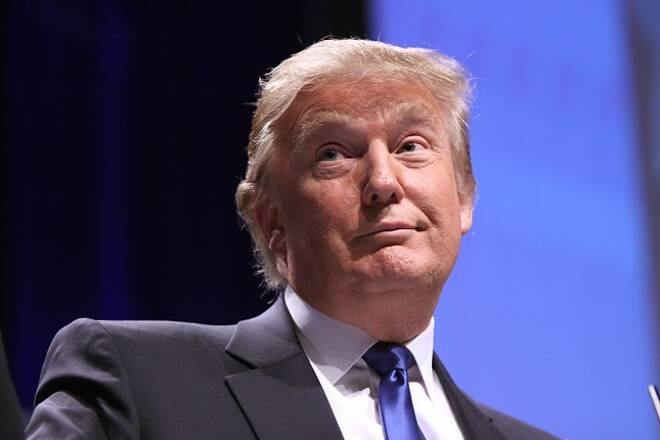Advertisement
Advertisement
This is What Winning Trade Wars Looks Like
By:
Amongst the many Trump campaign promises, the promise that the American people will “Have so much winning if I get elected that you may get bored with winning” stands out, however it doesn't appear like it will become boring anytime soon.
Yet again the headlines read: “The markets plunge after Trump tweets about China” and the campaign promise of 2015 seems even more humorous.
The markets had a negative reaction to news of retaliatory tariffs issued by China on $75 billion in U.S. goods, amongst them soybeans, coffee, whiskey, seafood and crude oil.
This was followed by a barrage of angry tweets from the U.S. President and a twitter order to the “Great American companies” that they are “hereby ordered to immediately start looking for an alternative to China”.
The response from the white house was not limited to tweets and included a tariff hike of already in place as well as on tariffs due to be added on September 1’st.
So should the American consumer be overfilled with patriotic pride over the prowess of their leader?
Winning the Trade War
Despite the claims made by Donald Trump that China is paying for the tariffs and how good for said tariffs are for the American economy, It appears that it is U.S. importers who actually pay the tariffs, and typically pass some if not all of the costs onto American consumers.
The trade war is estimated to cost U.S. companies and consumers more than $3 billion a month and the latest round should only add to the tally.
Despite the message that is circulated by the White House the president must have at least some sense of reality and the adverse effects of the tariffs. I believe this is why the rhetoric is becoming more aggressive towards China policy measures like labeling China as currency manipulators are taken.
The Currency Manipulators
The United States officially labeled China as a currency manipulator at the beginning of August, after the Yuan dropped beneath 7 Yuan to a US Dollar.
Making it the first official currency manipulation complaint since 1994.
The paradox is that China was labeled a currency manipulator for failing to manipulate its currency and keep it artificially inflated.
It’s simple macroeconomics, if the greenback is strengthening against most global currencies and the Chinese economy suffering from the tariffs, the Yuan is expected to depreciate but don’t let the economic facts get in the way of rhetoric, after all Trump doesn’t understand economic policy.
Enemy of the State
Don’t take my word for it, it was former Fed chairwoman Janet Yellen who said Trump doesn’t understand economic policy, however, as is so often the case the people least knowledgeable about a subject are those who discuss it most confidently.
It wasn’t macroeconomics in mind when the American President floated the following conundrum: “My only question is, who is our bigger enemy, Jay Powell or Chairman Xi?”.
It was chairman Powell’s decision to only cut 25 basis points during the last interest rate decision that won him the title “Enemy of the state”.
What makes the twitter assault even harsher is the fact the Fed is bound by its Dual Mandate to achieve both stable prices and maximum sustainable employment and last time I looked inflation is subdued and unemployment is near historic lows.
Pressuring the FED to massively cut rates for the purpose of short term political gains is risky and may exhaust the arsenal of tools the Fed will have to combat a recession prematurely.
The Bottom Line
Disrupting the global trade ecosystem may be a sufficient catalyst to usher in the next recession, in case the monetary policies advocated for by the white house are implemented the United States may find itself without any ammunition to stimulate the economy without launching an extensive QE program.
However there are opportunities in every outcome and if indeed a recession hits the U.S. when it has no more conventional policy tools, shorting the Dollar Index, Buying gold and running in and out of VIX contracts could prove lucrative.
About the Author
Alex Amdorauthor
With a strong background in economics and a passion for the financial markets, Alex has been contributing to FX Empire since July 2018, providing insightful analysis and expert commentary on various investment opportunities.
Advertisement
